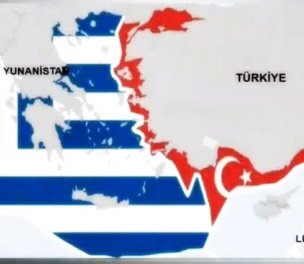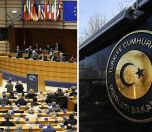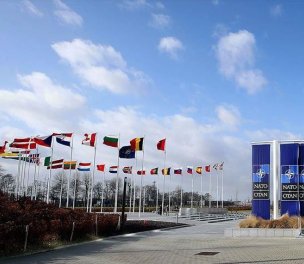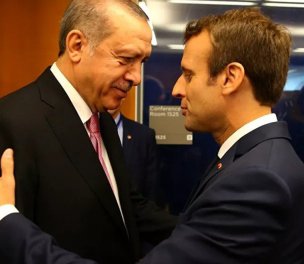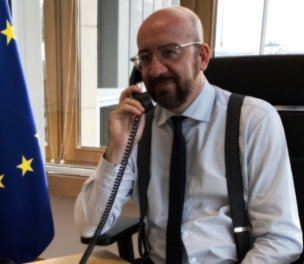Photo: AA
Click to read the article in Turkish
Minister of Foreign Affairs Mevlüt Çavuşoğlu has said that Turkey expects the European Union (EU) to act as an "honest broker" in the Eastern Mediterranean region.
"If you are part of the problem, how can you mediate between Turkey and Greece, or between Turkish and Greek Cypriots?" he asked while addressing the European Parliament's Committee on Foreign Relations yesterday (September 10) via video link from Senegal.
Çavuşoğlu said the EU has assumed the role of a judicial authority defending the claims of one side in the Eastern Mediterranean and its position was unjust and not in line with international law.
He noted that the European organization and Ankara were not on the best of terms, but this should not stand in the way of establishing a sincere dialogue channel.
Critical of Southern Cyprus' ascension to the EU in 2014, he further noted that Greece and Greek Cypriots had poisoned Turkey's strategic relations with the EU by absorbing the latter into its maximalist agendas.
In addition to Greece and Southern Cyprus, according to Çavuşoğlu, other countries such as Egypt, Lebanon, France and even an outside actor — the United Arab Emirates (UAE) — have recently sought to "forge alliances isolating Turkey and Northern Cyprus in the region."
He underlined that Ankara supported the mediation efforts by Germany and the EU, whereas Athens did not favor dialogue and had adopted a negative approach towards the de-escalation bid of NATO Secretary-General Jens Stoltenberg.
Turkey, without any preconditions, is ready to engage in dialogue but will set its own terms if Greece comes up with demands, said the country's top diplomat, adding the EU had maintained a neutral stance regarding maritime jurisdiction disputes experienced by Spain, Ukraine, Slovenia and Croatia.
Çavuşoğlu concluded that Turkey did not seek any escalation in the Eastern Mediterranean and favored a peaceful approach and President Recep Tayyip Erdogan himself had instructed the military vessels protecting the Oruc Reis energy research vessel not to be the first side to open fire, adding they would stand firm to protect the ship should Greek ships attempt to harass the research vessel.
Ties between Turkey and France
Çavuşoğlu also shed light on how Turkey and France were not on the same page on Syria, Libya and the Eastern Mediterranean.
He said Turkey considered France its ally, but its policy toward Ankara had changed following Ankara's military operation in Syria against the Kurdish People's Protection Units (YPG), which Turkey considers the Syrian branch of the outlawed Kurdistan Workers' Party (PKK).
"France is supporting the PKK to divide Syria. This plan was ruined. That's why France became very angry with us," said Çavuşoğlu, adding there were times when both countries had the same policy on Syria.
"I attended many meetings of the International Syrian Support Group," he said.
"We even criticized the US for being too flexible. We were against Russian policy there."
He condemned France's President Emmanuel Macron over his statement earlier in the day calling on the EU to be tough with Turkey.
He also demanded an apology from France for issuing a complaint in NATO on charges of harassment.
Maritime border claims of Turkey and GreeceTurkey signed a maritime border agreeement with Libya's Governmenf of National Accord (GNA) on November 27, 2019. Greece and Egypt signed a simillar agreement on August 7. |
Timeline of the Eastern Mediterranean crisisThe tension between Turkey and Greece over their right to explore energy resources in the Eastern Mediterranean has seriously escalated over the last months. The latest developments leading to this escalation are briefly as follows: On July 21, Turkey issued its first Navtex alert for Oruç Reis seismic vessel's exploration activities in the Eastern Mediterranean. On July 28, Turkey announced after Germany's diplomatic efforts that it suspended hydrocarbon exploration activities and stated that it was ready to talk with Greece. On August 6, Greece and Egypt signed a maritime border agreement. On August 10, Turkey announced that its drillship Oruç Reis would resume energy exploration in the Eastern Mediterranean. It said the ship will continue its work along with the ships Cengiz Han and Ataman until August 23. On August 14, the EU foreign miniters discussed the crisis at an extraordinary meeting, calling on Turkey to end hydrocarbon exploration activities in contested waters. On August 16, Turkey issued a Navtex, announcing that its drill ship Yavuz will continue its work exploring for energy resources off the island of Cyprus. On August 23, Turkey issued another Navtex, stating that the Oruç Reis vessel would continue its activities until August 27. On August 24, Greece held joint naval drills with the US in the south of Crete island. One day later, Turkey conducted naval exercises with Italy. On August 25, Germany's Minister of Foreign Affairs Heiko Maas visited Athens and Ankara to encourage the two countires to have direct talks. On the same day, Turkey held replenishment exercises with Italy in the Eastern Mediterranean. On August 26, US President Donald Trump had phone talks with President Recep Tayyip Erdoğan and Prime Minister of Greece Kyriakos Mitsotakis, urging them to reduce tensions and start dialogue. On the same day, Turkey and the US conducted joint maritime exercises. On August 27 and 28, EU foreign ministers met with the Eastern Mediterranean crisis on the top of their agenda. The Union's foreign polict head Josep Borrell said after the meeting that Turkey's ships might be sanctioned if they continued hydrocarbon activities. Turkey's Ministry of National Defense on August 28 announced that it intercepted six F-16 fighters planes of Greece, which it said were closing in on the area where Turkey issued a Navtex. On September 1, the US lifted the arms embargo on Southern Cyprus. On September 2, Turkey issued two Navtex alerts for Russia's gunnery exercises in the Eastern Mediterranean. It was stated that Russia would conduct exercises in two different areas that correspond to Turkey's hydrocarbon exploration activities on the east and west of the Cyprus island. On September 3, NATO Secretary General Jens Stoltenberg said, "Following my discussions with Greek and Turkish leaders, the two Allies have agreed to enter into technical talks at NATO to establish mechanisms for military deconfliction to reduce the risk of incidents and accidents." On September 4, Prime Minister of Greece Kyriakos Mitsotakis said that Greece would only enter into a dialogue with Turkey if it "stops provocations" in the Eastern Mediterranean. Shortly before this statement, Turkey's Foreign Ministry stated, "Turkey is ready to enter into dialogue with Greece without any preconditions, in order to find lasting, fair and equitable solutions to all outstanding issues between Turkey and Greece." On September 8, the state-run Anadolu Agency (AA) reported that the meeting between military delegations from Turkey and Greece was rescheduled for September 10. On September 10, military delegations from Turkey and Greece had technical talks at NATO headquarters to prevent military engagement. |
(EKN/VK)






